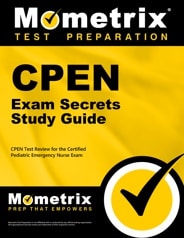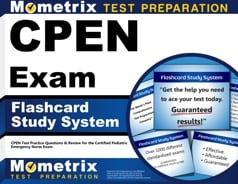The Certified Pediatric Emergency Nurse (CPEN) exam is a certification developed by the Board of Certification for Emergency Nursing (BCEN). The exam is for emergency nurses to prove their expertise and knowledge in pediatric emergency nursing.
Click “Start Test” above to take a free CPEN practice test, and check out our premium-quality CPEN test prep resources by clicking the links below!
Exam Eligibility
You must hold a current, unrestricted Registered Nurse license in the United States, its territories, Canada, or Australia. You may take the exam if you are not working in a clinical setting, as long as your license is current and unrestricted. BCEN recommends that you have two years of experience in pediatric emergency nursing, although it is not required.
Foreign Eligibility
Individuals licensed in other countries may be eligible for BCEN’s International Credential Evaluation service. Contact the Commission on Graduates of Foreign Nursing Schools (CGFNS) International for assistance in validating your credentials to qualify for the CPEN exam.
CPEN Exam Outline
The CPEN Exam is a computer-delivered exam consisting of 175 multiple-choice questions. There are 50 non-scored questions scattered throughout the exam. You will not be able to distinguish between a scored and a non-scored question, so answer each question as if it were scored. The test delivery method is the same, regardless if the exam is taken in a testing center or via Live Remote Proctoring. You have three hours to complete the exam.
There are 15 concepts integrated throughout the exam:
- Collaboration with healthcare providers
- Communication
- Conflict management
- Critical incident stress management
- Discharge planning
- Ethical considerations
- Evidence-based practice
- Family-centered care
- Growth and development
- Health promotion and injury prevention
- Medication administrations
- Pain management
- Patient safety
- Pharmacology
The CPEN exam is split into six domains.
1. Triage Process (20 scored questions)
The questions in this domain assess your knowledge and skills related to the following:
Emergency Intake
- Visual assessment
- Isolation concerns
- Behavioral status and risk for harm
- Immunization status
- Cultural and language considerations
- Sexual orientation and gender identity
- Triage priority based on acuity and resources
Emergency Preparedness
- Mass casualty
- Decontamination
2. Assessment (25 scored questions)
The questions in this domain assess your knowledge and skills related to the following:
History and Physical
- Caregivers’ perception of child’s baseline and current status
- Developmental milestones
- Family functioning and dynamics
- Primary and secondary survey
- Children with special needs
Pain
- Pharmacological and non-pharmacological interventions
- Developmentally appropriate pain assessment and reassessment
3. Additional Medical Emergencies (56 scored questions)
The questions in this domain assess your knowledge and skills related to emergencies in the following areas:
- Respiratory
- Cardiovascular
- Neurological
- Gastrointestinal
- Genitourinary and obstetrical
- Maxillofacial, ocular, and ear/nose/throat
- Musculoskeletal
- Integumentary
- Hematology/oncology
- Endocrine/metabolic
4. Special Considerations (25 scored questions)
The questions in this domain assess your knowledge and skills related to the following types of emergencies:
- Neonatal
- Behavioral health
- Maltreatment
- Environmental
- Toxicology
- Communicable diseases
5. Multi-System Considerations (12 scored questions)
The questions in this domain assess your knowledge and skills related to the following:
- Submersion injuries
- Sepsis
- Anaphylaxis
- Post-resuscitative care
- Procedural sedation
6. Professional Issues (12 scored questions)
The questions in this domain assess your knowledge and skills related to the following:
- Legal issues
- Nursing practice
- Patient and family considerations
Check Out Mometrix's CPEN Study Guide
Get practice questions, video tutorials, and detailed study lessons
Get Your Study Guide
Registration
To apply for the exam, visit the BCEN website and create an account.
Before you can schedule your exam, you need to pay the examination fee. The exam fee is $230 for Emergency Nurses Association (ENA) members, $370 for non-members, and $195 for active-duty military, reservists, and veterans.
Online Registration
You can register for the exam online at the BCEN website. Your registration is processed immediately, giving you the opportunity to schedule your exam on the day you apply. Payment is accepted by credit card or prepaid voucher (obtained through your employer, if applicable).
Registration by Mail
To pay the examination fee by check or money order, complete the registration process online at the BCEN website. Print your “Confirmation of Form Completion” and mail, with your payment, to BCEN. An exam eligibility email is sent when your registration fee is received. Mailed registrations can take up to four weeks to process, and you cannot schedule your exam until you receive the email.
Scheduling Your Exam
Your exam is scheduled through PSI, and you have a 90-day window to schedule and take your exam. If you do not schedule your exam within your testing window or schedule and fail to attend your testing appointment, your exam fee is forfeited.
There are two methods of test delivery: at a testing center or online via remote proctor. PSI has on-site testing centers located worldwide, and most centers offer testing six days a week, holidays excepted.
Select the center most convenient, and schedule your exam date and testing time within the 90-day window. You can reschedule or cancel your exam at no charge if done 48 hours before your appointment. Remember to reschedule your canceled exam within your 90-day window.
Scheduling online testing via Live Remote Proctoring (LRP)
Before selecting the online testing option, ensure you meet the basic requirements for test delivery. Requirements include a PC or MAC only (iPad, Chromebook, and other tablets are incompatible), an operating system of Windows 7 or higher or MAC 10, Chrome 58.0 or higher browser, webcam, microphone, speakers, Wi-Fi, and a stable internet connection of at least 500 kbps.
It is recommended that you conduct a system check before registering for LRP. The system check is found on the BCEN website. Additionally, your testing area must be quiet and private, free from distractions and others entering your testing space.
After you have determined that your equipment meets the minimum requirements for online delivery and you have received your exam eligibility email, schedule your exam through PSI. Choose the appointment time most convenient to you, ensuring it is within the 90-day testing window. Your exam must be rescheduled within the 90-day testing window.
If you need to cancel or reschedule your appointment, make sure you cancel it 48 hours before your appointment, or your exam fee is forfeited.
Test Day
Both test delivery methods require you to present a valid, unexpired, government-issued ID. Acceptable IDs include a passport, driver’s license, visa, or state/province ID card (with photo). Your ID must match your test registration.
In-person Testing
You must check in for your appointment at least 30 minutes before your exam starts. Provide your ID, review and sign the rules and regulations agreement, and store your items in the designated area. The proctor will take your photo and direct you to your testing station, where you are provided two sheets of paper during the exam. The only item you can have at your station is a writing utensil. Everything else is stored or left at home.
Live Remote Proctoring
You must complete the check-in process within 30 minutes of your scheduled appointment time. Before your exam can begin, the proctor will ask you to download the secure browser, complete a system check of your computer, test your microphone and web camera, and scan your testing area using your computer’s camera. Finally, you will present your ID and have your photograph taken.
Your camera and microphone must remain on during the exam. Your desk must be clean, with only 2 pieces of blank paper and a writing utensil accessible. You can only use one monitor during the exam; extra monitors need to be unplugged. Once your check-in is complete and your testing area meets approval, your exam will begin.
How the Exam is Scored
If you took your exam at a testing center, you are provided a printed copy of your score report. If you took the exam via remote proctor, your pass or fail status is displayed on your computer screen. A copy of your score report is sent immediately to your BCEN account, regardless of the testing method.
Your exam score is based on the number of questions you answered correctly, and your final score is not based on a curve. You must answer at least 113 questions correctly to pass the exam and receive certification. If you pass, your certification is valid for four years. A certificate and wallet card is mailed to the address on file with BCEN within 15 business days.
Retaking the Test
You can take the CPEN exam as often as needed to pass the exam, but you must wait 90 days between attempts. After the 90-day waiting period, you must submit a retest exam application and pay the applicable fee through your BCEN account. The retake fee is $285 for ENA members, $380 for non-members, and $195 for active-duty military, reservists, and veterans.
Check Out Mometrix's CPEN Flashcards
Get complex subjects broken down into easily understandable concepts
Get Your Flashcards
How to Study for the CPEN Exam
How to Study Effectively
Your success on CPEN test day depends not only on how many hours you put into preparing but also on whether you prepared the right way. It’s good to check along the way to see whether your studying is paying off. One of the most effective ways to do this is by taking CPEN practice tests to evaluate your progress. Practice tests are useful because they show exactly where you need to improve. Every time you take a free CPEN exam practice test, pay special attention to these three groups of questions:
- The questions you got wrong
- The ones you had to guess on, even if you guessed right
- The ones you found difficult or slow to work through
This will show you exactly what your weak areas are and where you need to devote more study time. Ask yourself why each of these questions gave you trouble. Was it because you didn’t understand the material? Was it because you didn’t remember the vocabulary? Do you need more repetitions on this type of question to build speed and confidence? Dig into those questions and figure out how you can strengthen your weak areas as you go back to review the material.
Answer Explanations
Additionally, many CPEN practice tests have a section explaining the answer choices. It can be tempting to read the explanation and think that you now have a good understanding of the concept. However, an explanation likely only covers part of the question’s broader context. Even if the explanation makes sense, go back and investigate every concept related to the question until you’re positive you have a thorough understanding.
Comprehend Each Topic
As you go along, keep in mind that the CPEN practice test is just that: practice. Memorizing these questions and answers will not be very helpful on the actual test because it is unlikely to have any of the same exact questions. If you only know the right answers to the sample questions, you won’t be prepared for the real thing. Study the concepts until you understand them fully, and then you’ll be able to answer any question that shows up on the test.
Strategy for CPEN Practice
When you’re ready to start taking practice tests, follow this strategy:
- Remove Limitations. Take the first test with no time constraints and with your notes and CPEN study guide handy. Take your time and focus on applying the strategies you’ve learned.
- Time Yourself. Take the second practice test “open book” as well, but set a timer and practice pacing yourself to finish in time.
- Simulate Test Day. Take any other practice tests as if it were test day. Set a timer and put away your study materials. Sit at a table or desk in a quiet room, imagine yourself at the testing center, and answer questions as quickly and accurately as possible.
- Keep Practicing. Keep taking practice tests on a regular basis until you run out of practice tests or it’s time for the actual test. Your mind will be ready for the schedule and stress of test day, and you’ll be able to focus on recalling the material you’ve learned.
FAQs
Q
How many questions are on the CPEN exam?
A
There are 175 multiple-choice questions on the exam.
Q
How long is the CPEN exam?
A
The time limit for the exam is 3 hours.
Q
What is a passing score for the CPEN exam?
A
To pass the exam, you will need to answer 75% of the questions correctly.
Q
How much does the CPEN exam cost?
A
The exam costs $285 for Emergency Nurses Association (ENA) members, $380 for non-members, and $195 for active-duty military, reservists, and veterans.
Mometrix Test Preparation is not affiliated with or endorsed by any official testing organization. All organizational and test names are trademarks of their respective owners.


